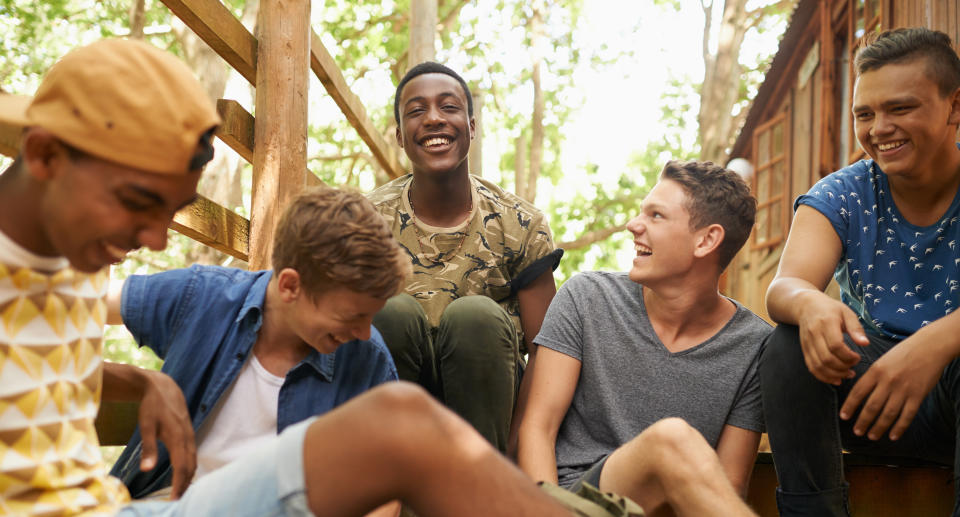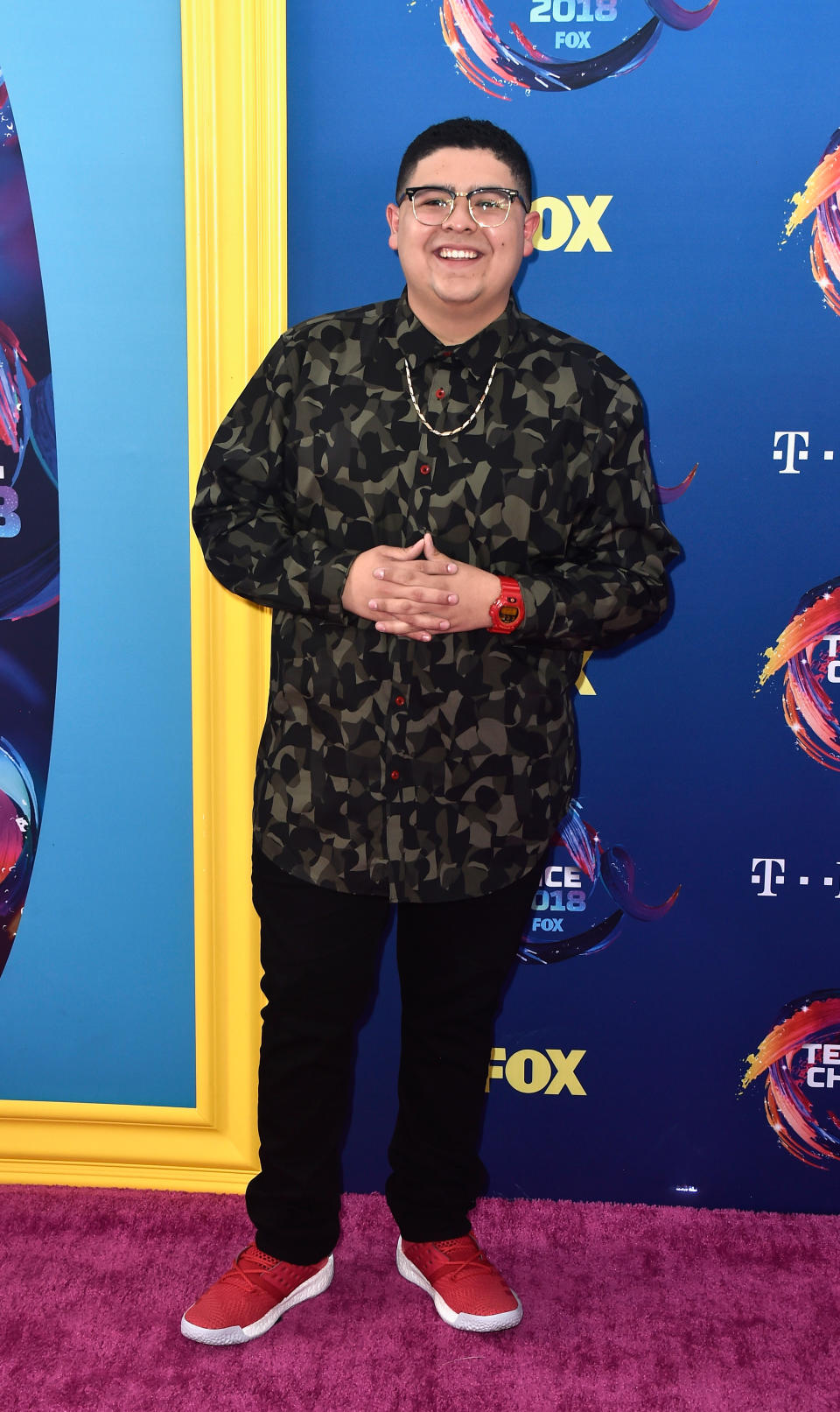'I was never taught to love my fatness': What Generation Z is teaching older men about body positivity

Introducing EveryBody, a series by Yahoo Canada highlighting the people and organizations working to end weight stigma, promote size inclusivity and prove that everybody and every body has value.
When it comes to labels, Generation Z — born between the years of 1995 and 2010 — prefers to opt out of categorizing themselves. Fluidity is the new norm, as is embracing change. But with certain aspects of life, Gen Z is doing the opposite, reclaiming words that were once used as insults and turning the tables to embrace the qualities that make them unique. One of these labels is “fat.”

In recent years, the body positivity movement has reached new lengths, from forcing the fashion industry to become more inclusive to calling out brands that promote harmful diet practices. Thanks to the efforts of many Millennial trailblazers, younger Gen Z’ers are growing up with self-love taught early on. However, when it comes to being fat and male, older generations seem to have fallen short. Body positivity was founded by women and has often been viewed as a “feminine” movement, preventing many older men from accepting its message of body respect and inclusivity.
ALSO SEE: 'This is my body': Beauty vlogger Jaclyn Hill shows off stretch marks in new video
“At this moment, it feels as if it's okay for females to express their body positive image, but there's still a stigma for men to express their love for their bodies,” says Max Rosenzweig, 18. “For example, one of my favourite artists, Lizzo, constantly stands as a leader of the body positivity movement. Recently, she has gathered the support of a mainstream audience through her music and is able to spread her positive outlook on weight and body image while there are many male body positive activists who do not have the platform to share that we should all love our bodies.”

Gen Z men and boys, however, are refusing to follow in the footsteps of their elders. Breaking down this barrier, Gen Z is handling male body image and weight bias better and healthier than any generation before it.
“Gen Z is changing the future and breaking the stereotypes. The positive influences and role models are sparking a movement for young people to continue the conversation,” says Alexsey Reyes, 18, when asked how Gen Z men are changing the conversation around body image. “With the help of social media and tech, Gen Z continues to create change and normalization.”
ALSO SEE: What The Health?! Woman's ruptured brain cyst originally misdiagnosed as migraines
Ben Gotzmann, 19, agrees, saying, “I think every bigger guy has experienced some body image issues in their life, it’s just hard because the ‘standard of beauty for men is chiseled abs, built thighs, and broad shoulders, and the reality is that not a lot of guys have that, unless they’re constantly in the gym working out.”
Though acceptance is often at the forefront of the movement, the ultimate goal of many Gen Z’ers, including Reyes, is normalization. Fat men have longed been portrayed in the media before in a negative light: stereotypical portrayals of fat men being lazy and useless fill television shows and movies. What Gen Z wants, as Reyes explains, is for men with diverse body types to be seamlessly integrated into media portrayals without the bat of an eye.

In some youth-targeted programs, this change has slowly been implemented. The 2018 Disney Channel adaptation of the stage musical “Freaky Friday” featured a plus-size teenage boy in a secondary role (played by Isaiah Lehtinen). Towards the end of the film, a message about self-love is thrown in as Lehtinen’s character Karl fears that he will be judged by his peers based on his looks. With a reminder from his friends that all bodies are beautiful, he is back a few seconds later showing all young boys that size should never impact your happiness. Rico Rodriguez of “Modern Family” also shows the push for plus-size male representation, as does Benjamin Flores Jr. in Netflix’s recent flick “Rim of the World.”
“Helping normalize being different is so important,” Reyes says. “We want to be able to show love to everyone regardless of what they look like. [It is the] best way to understand and have compassion.”
But what impact is this normalization and representation having on real Gen Z youth? For Reyes, it’s taught him over the past two years that he should always feel comfortable posting pictures of his body and being his best self. “It wasn’t until a year or two ago that I began to put myself out there. I started seeing more acceptance in the media which made me feel comfortable,” he says.

Gotzmann adds, “[We’re] finally starting to be seen as humans and not just for what [our] weight is. I attribute a lot of this to people being body positive on social media, and the easy access mostly everyone now has to social media.”
For Gen Z, social media is a driving force in the push towards male body positivity. Gen Z has grown up with technology practically imprinted into their lives. With the growing online presence of plus-size men who push for self-love and show that happiness is achievable and attainable at any weight, a tight knit community is formed where Gen Z can learn early on that fat men have a place in the movement.
“As a fat, Jewish male, I feel included and represented on a whole entirely different level than I ever could before social media. Additionally, I think that the improvement of handling male weight bias has to do with representation. Now, anyone who was disenfranchised or discriminated in the past can find leaders and influencers who represent who they are,” says Rosenzweig.
ALSO SEE: Plus-size singer Lizzo wants people to stop calling her 'brave' for posing nude
But how else are Gen Z men changing the conversation and pushing themselves towards self-love? Gotzmann, for instance, sets out to frequently remind himself of his worth. Reyes, on the other hand, is using his large social media platform to normalize male body diversity. Both agree on one thing: the most helpful tool is a healthy conversation.

“I think people kind of get into this space where if things aren’t talked about widely, nobody really likes to talk about them, and I feel like if we all started talking about it more, it could really help with men being more comfortable talking about their bodies, their insecurities, and things that they love about themselves, too,” Gotzmann says.
ALSO SEE: 'I had to walk away': Why one body positivity blogger called 'time-out' on social media
“Educating the youth about [fatphobia] can benefit the future,” says Rosenzweig. “As a young boy, I never was taught to love my fatness or to accept the way my body is but to eat healthily and exercise. Of course, eating well and exercising is essential to living a healthy life, but without teaching the youth that they all have different body types and that they should love their uniqueness, leaves them thinking that they need to constantly work to meet a standard that is mentally unhealthy.”
Gen Z doesn’t have it down perfect; No one does. But with every day, they push harder against the societal norms placed on fat men. They aim to educate and represent this community more and more in the future, and to show that just like women, fat men deserve a seat at the table and in the body positive conversation.

“Feeling comfortable has made me open up more about my body and not be ashamed or worry about what others may think. It takes time and courage to take that leap and be vulnerable,” Reyes says. “Starting this conversation is just as important as maintaining it. We don’t want to forget anyone. There needs to be more effort into including all the sizes and shapes because everyone deserves to feel welcomed. Representation starts with you.”
Let us know what you think by commenting below and tweeting @YahooStyleCA! Follow us on Twitter andInstagram.


